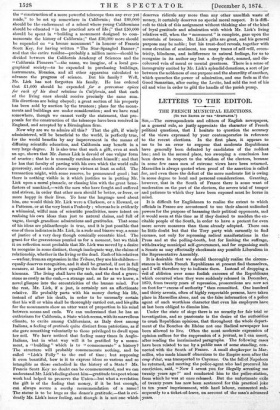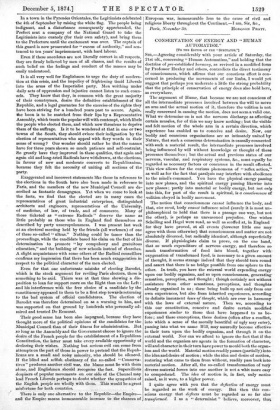LETTERS TO THE EDITOR.
THE FRENCH MUNICIPAL ELECTIONS.
[TO THE EDITOR OF THE SPBOTAT011.1
SIR,—The correspondents and editors of English newspapers, as a general rule, so justly appreciate the character of French political questions, that I hesitate to question the accuracy of the views expressed by your contemporaries in reference to the recent elections. In the first place, it appears to me to be an error to suppose that moderate Republicans have generally been defeated by candidates of the reddest hue ; and in the second place, too sweeping a conclusion has been drawn in respect to the wisdom of the electors, because in some few cases men of extreme views have been returned. Marseilles is always quoted when proof of the assertion is called ..for, and even there the defeat of the more moderate list is owing in some degree to local and personal considerations. Granting, however, that in the South of France there is some want of moderation on the part of the electors, the severe trial of temper and patience to which they have been exposed must be borne in mind.
It is difficult for Englishmen to realise the extent to which officials in France are accustomed to use their almost unlimited powers for the purpose of harassing their political opponents, and it would seem at this time as if they desired to madden the ex- citable people of the South, in order to have a pretext for even more severe measures than those already adopted. There cau be little doubt but that the Tory party wish earnestly to find excuses, not only for repressing radical manifestations in the Press and at the polling-booth, but for limiting the suffrage, withdrawing municipal self-government, and for organising such a Senate as may effectually checkmate any possible Liberalism in the Representative Assembly.
It is desirable that we should thoroughly realise the circum- stances in which French Republicans at present find themselves, and I will therefore try to indicate them. Instead of dropping a. veil of oblivion over some foolish excesses of the Republicans which occurred when they were suddenly released in December, 1870, from twenty years of repression, prosecutions are now set on foot for " excess of authority" then committed. One hundred and thirty arrests, often of highly respectable persons, have taken place in Marseilles alone, and on the false information of a police agent of such worthless character that even his employers have at last been obliged to dismiss him.
Under the state of siege there is no security for fair trial or investigation, and so passionate is the desire of the authorities to crush Republican opinions, that throughout the whole depart- ment of the Bouches du Rhone not one Radical newspaper has been allowed to live. Often the most moderate expression of opinion suffices for the suppression of a journal, as I can assert, after reading the incriminated paragraphs. The following cases have been related to me by a public man of some standing, con- nected with the South of France. A small shopkeeper in Mar-. Bellies, who made himself obnoxious to the Empire soon after the coup d'itat, was transported to Cayenne. On the fall of Napoleon he returned, and meeting the police-agent who had procured his conviction, said, "Now I arrest you for illegally arresting me twenty years ago !" and conducted him to the police-station, from which he was at once released. But the unfortunate exile of twenty years has now been sentenced for this practical joke to ten years' imprisonment, with hard labour, commuted sub- sequently to a ticket-of-leave, on account of the man's advanced years.
In a town in the Pyrenees Orientales, the Legitimists celebrated the 4th of September by raising the white flag. The people being indignant, and a disturbance consequently apprehended, the Prefect sent a company of the National Guard to take the Legitimists into custody (for their own safety), and bring them to the Prefecture until the excitement was over. The captain of this guard is now prosecuted for "excess of authority," and sen- tenced to ten years' imprisonment, with hard labour.
Even if these anecdotes are not literally correct in all respects, they are firmly believed by men of all classes, and the results of such belief on the feelings and conduct of the masses may be easily understood.
It is all very well for Englishmen to urge the duty of modera- tion at this crisis, and the impolicy of frightening timid Liberals into the arms of the Imperialist party. Men writhing under daily acts of oppression and injustice cannot listen to such coun- sels. They know that they, in common with the great majority of their countrymen, desire the definitive establishment of the Republic, and a legal guarantee for the exercise of the rights they have been striving for a hundred years past to secure. Again, the boon is to be snatched from their lips by a Representative Assembly, which treats the popular will with contempt, which libels the people who elected them, and which now threatens to deprive them of the suffrage. Is it to be wondered at that in one or two -towns of the South, they should evince their indignation by the election of representatives who appeal with fiery words to their sense of wrong? Our wonder should rather be that the masses have for three years shown so much patience and self-restraint. So greatly have they improved in-these qualities, that again and again old and long-tried Radicals have withdrawn, at the elections, in favour of new and moderate converts to Republicanism, because they felt the necessity of uniting all sections of the party.
Exaggerated and incorrect statements like those in reference to the elections in the South have also been made in reference to Paris, and the members of the new Municipal Council are de- scribed as fantastic demagogues. Yet when we come to look at the facts, we find that the elected are in many cases the representatives of great industrial enterprises, distinguished .architects and engineers, representatives of the University, of medicine, of law, of trade, and of commerce. Many of those ticketed as "extreme Radicals" deserve the name as little probably as those who in England find themselves so described by party unscrupulousness. I was present last week at an electoral meeting held by the friends (all workmen) of one of these so-called "ultras." Nothing could be tamer than the proceedings, while the candidate based his claim on the fact of his determination to promote "lay compulsory and gratuitous education," and the building of new schools instead of churches. A slight acquaintance with some others of the Radical councillors confirms my impression that there has been much exaggeration in respect to the political character of the men elected.
Even for that one unfortunate mistake of electing Barodet, which is the stock argument for reviling Paris electors, there is something to be said. Thiers was at that time showing a dis- position to lean for support more on the Right than on the Left ; and his interference with the free choice of a candidate by the constituency appeared to them to be a first step towards returning to the bad system of official candidatures. The election of Barodet was therefore determined on as a warning to him, and was supported on that ground by hundreds who personally ad-. mired and trusted De Remusat.
Their good sense has been also impugned, because they have thought more of the political opinions of the candidates for the Municipal Council than of their fitness for administration. But se long as the Assembly and the Government choose to ignore the desire of the French people for the establishment of a Republican Constitution, the latter must take every available opportunity of declaring their wishes. Nothing but serious evil can come from attempts on the part of those in power to pretend that the Repub- licans are a small and noisy minority, who should be silenced. If the blind and selfish obstinacy of the so-called " Conserva- tives " produces another civil war, the blame must lie with them alone, and Englishmen should recognise the fact. Supercilious despisers of popular movements on our side of the Channel may lead French Liberals perhaps to doubt whether the sympathies of the English people are wholly with them. This would be a great misfortune for both countries.
There is only one alternative to the Republic—the Empire— and the Empire means immeasurable increase to the chances of European war, immeasurable loss to the cause of civil and religious liberty throughout the Continent, —I am, Sir, &c.,



































 Previous page
Previous page